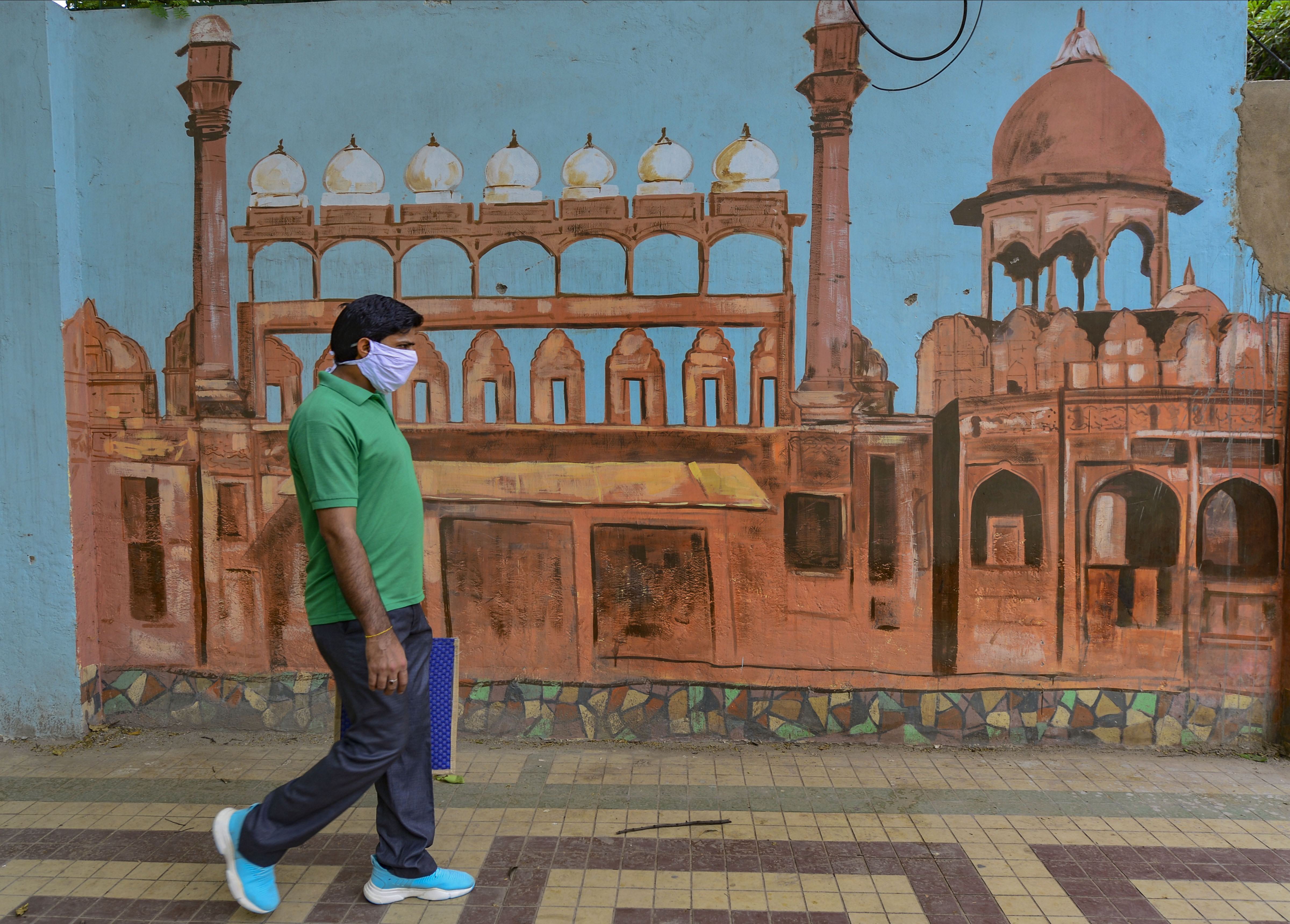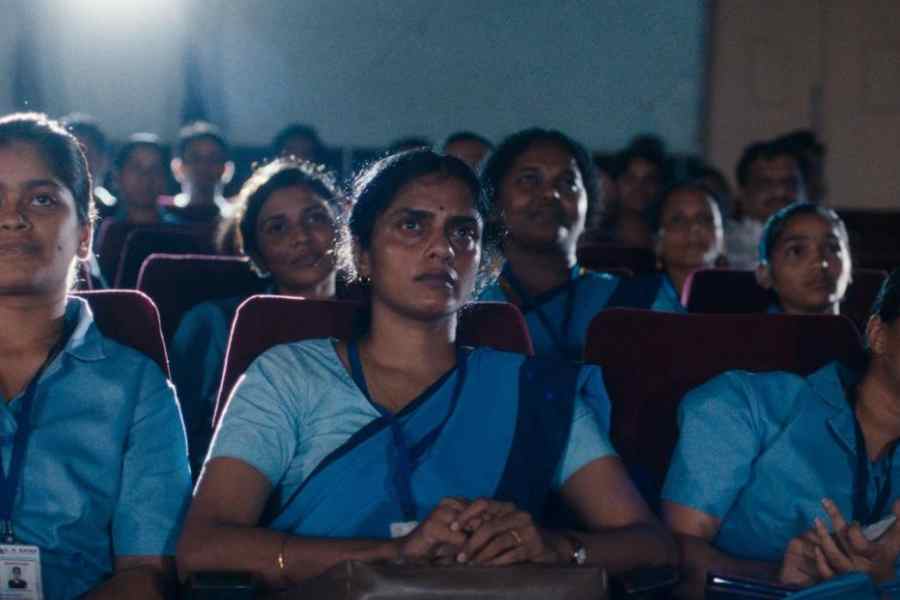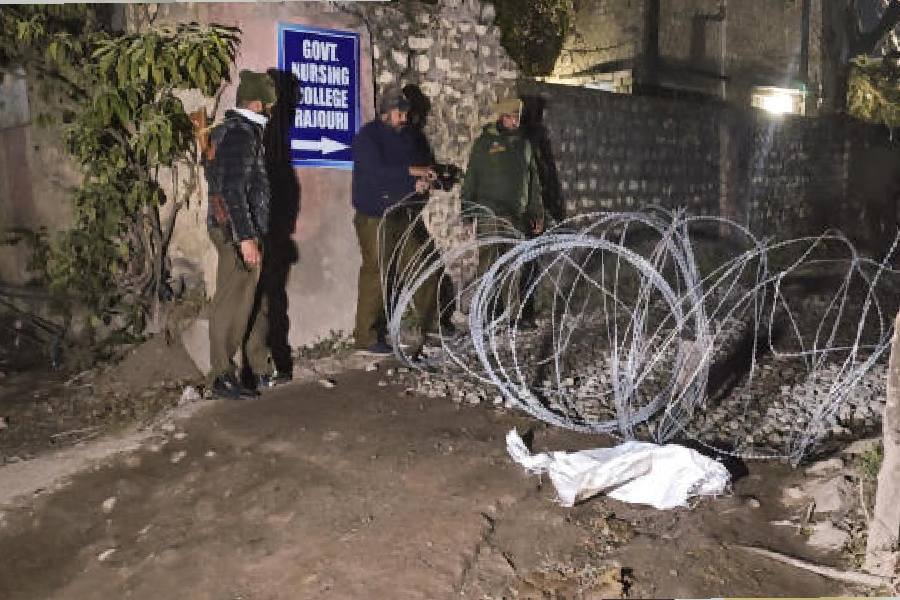Total number of infections 67,152, death toll 2,206
Total number of infections rose to 67,152 on Monday and the death toll due to the disease increased to 2,206 with 97 fresh fatalities, according to the Union health ministry.
The number of active Covid-19 cases stood at 44,029 in the country. While 20,916 people have recovered, one patient has migrated, it said.
'Thus, around 31.15 per cent patients have recovered so far,' a senior health ministry official said.
A total of 97 deaths have been reported since Sunday morning. Of these 53 were in Maharashtra, 21 in Gujarat, 14 in West Bengal, three in Tamil Nadu, and one each in Andhra Pradesh, Bihar, Haryana, Karnataka, Haryana and Rajasthan.
Of the 2,206 fatalities, Maharashtra tops the tally with 832 fatalities, Gujarat comes second with 493 deaths, followed by Madhya Pradesh at 215, West Bengal at 185, Rajasthan at 107, Uttar Pradesh at 74, Delhi at 73, Tamil Nadu at 47 and Andhra Pradesh at 45.
Karnataka and Punjab have recorded 31 deaths each.
Telangana has reported 30 fatalities due to the respiratory disease, Haryana has registered 10, Jammu and Kashmir nine, Bihar six and Kerala four.
Jharkhand and Odisha have recorded three Covid-19 fatalities each while Himachal Pradesh, Assam and Chandigarh have reported two deaths each.
Meghalaya and Uttarakhand have reported one death each, according to the ministry data.
According to the ministry's website, more than 70 per cent of the deaths are due to comorbidities.
- Andaman & Nicobar 33
- Andhra Pradesh 2018
- Arunachal Pradesh 1
- Assam 62
- Bihar 724
- Chandigarh 173
- Chhattisgarh 59
- Delhi 7233
- Goa 7
- Gujarat 8195
- Haryana 719
- Himachal Pradesh 60
- Jammu & Kashmir 879
- Jharkhand 157
- Karnataka 862
- Kerala 519
- Ladakh 45
- Madhya Pradesh 3614
- Maharashtra 22171
- Manipur 2
- Meghalaya 13
- Mizoram 1
- Odisha 394
- Puducherry 11
- Punjab 1877
- Rajasthan 3898
- Tamil Nadu 7204
- Telangana 1196
- Tripura 136
- Uttarakhand 68
- Uttar Pradesh 3520
- West Bengal 1939
'Our figures are being reconciled with the ICMR (Indian Council of Medical Research),' the ministry said on its website.
State-wise distribution is subject to further verification and reconciliation, it said.
ICMR guidelines for recording virus deaths
Covid-19 would be recorded as an 'underlying cause of death' when leading to pneumonia, cardiac injury and clotting in the bloodstream, among others, according to the guidance issued by ICMR for appropriate recording of deaths due to the disease in India.
Explaining the public health significance of recording the cause of death in the pandemic, ICMR said Covid-19 is a new disease and is affecting all communities and countries and a robust data is needed in India to measure the public health impact of the ailment and to plan for timely health interventions.
In its guidance for appropriate recording of Covid-19 deaths in India, the Indian Council of Medical Research (ICMR) said deaths with inconclusive test results, but in which coronavirus symptoms are present will be recorded as 'probable Covid-19' fatalities.
Deaths in which tests are awaited with the presence of symptoms will be recorded as suspected deaths, while those testing negative but have symptoms will be mentioned as clinically-epidemiologically diagnosed Covid-19, the guidance stated.
Its clinical presentation ranges from mild to severe, and fatality depends on the severity of the illness, associated comorbid conditions and age of patients.
'Patterns of disease and patterns of death can come from only standardised recording of clinical disease history and cause of death, and therefore epidemiological surveillance of disease and death are important.
'Robust data is needed from every district and state in India to measure the public health impact of Covid-19 and to plan for timely health interventions and protect communities.
'At the same time, other health conditions affecting populations need to be also monitored so that the health system is prepared for responding to the needs of the population,'' the document stated.
It lists forms where a health facility or a medical practitioner has to mention the sequence of events leading to death, which includes the immediate cause of death, cause of death antecedent to immediate cause, underlying cause of death and the manner of death, among others.
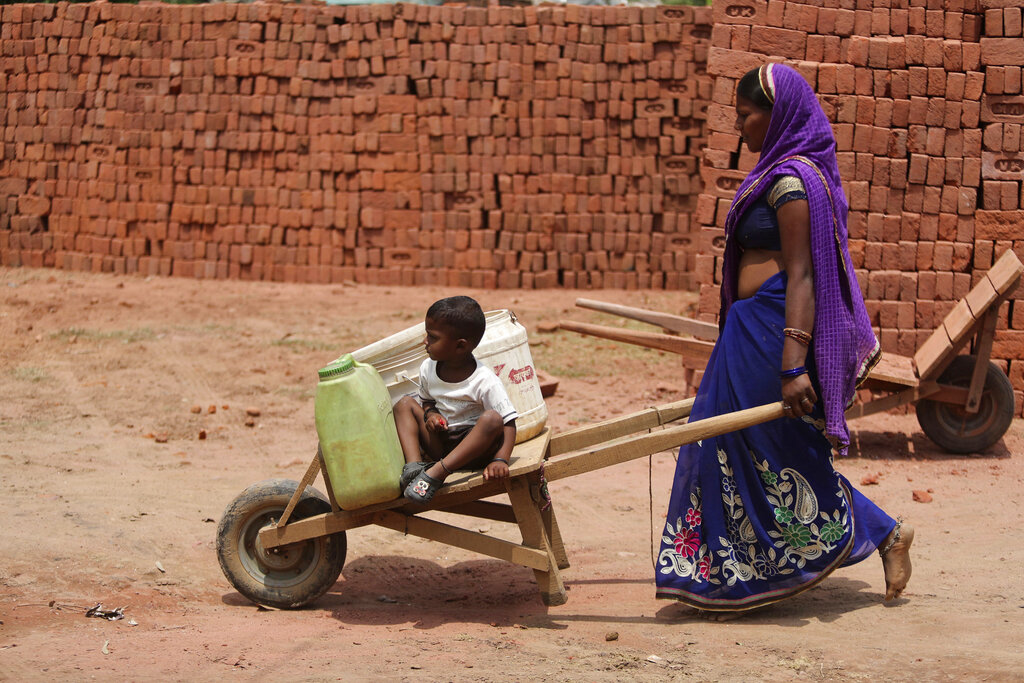
A woman pushes a cart with her child as she works at a brick kiln during lockdown to curb the spread of new coronavirus on the outskirts of Jammu, Sunday, May 10, 2020. AP
ICMR against invasive methods for autopsy
Invasive techniques should not be adopted for forensic autopsy in Covid-19 death cases as doctors and other mortuary staff are exposed to potentially dangerous health risks due to organ fluids and secretions, the ICMR has said in a draft document.
According to the final draft 'Standard Guidelines for Medico-legal autopsy in Covid-19 deaths in India' released by the Indian Council of Medical Research (ICMR), deaths in hospital and under medical care due to coronavirus infection is a non-MLC case and doesn't require postmortem and the required certification of death is being done by treating doctors.
Some of the cases of suspected Covid-19 deaths, which are brought dead to hospitals are labelled by emergency doctors as MLC and the body is sent to the mortuary and police are informed which may need postmortem examination for clarity in the cause of death.
'The forensic autopsy of these cases may be waived off,' the draft guidelines said.
Some of the cases are suicide, homicide or accident and may be positive or suspected case of coronavirus infection. After the inquest procedure, if any crime is not suspected, police have the authority to waive off conduction of medico-legal autopsy, even though labelled as medico-legal case.
'The investigating police officer must proactively take steps to waive off unnecessary autopsies during such pandemic situation,' the draft document said.
Ahmedabad decides to go digital
To contain the spread of Covid-19, Ahmedabad, the second-worst coronavirus affected city in India, has decided to go completely digital to prevent the spread of the pandemic through currency notes.
As part of the preparatory strategy post-lockdown period, all retail and home delivery agencies have been contacted and asked to get 100 per cent screening of their delivery staff, according to an order.
As an abundant caution to prevent the spread of coronavirus through currency notes, it has been made mandatory to accept digital payments through Unified Payment Interface (UPI) and other platforms, according to the order issued on Monday by Gujarat additional chief secretary Rajiv Kumar Gupta.
From May 15, all home deliveries will have to be paid digitally and no cash on delivery will be accepted, the order stated. Gupta is also in-charge of coronavirus-related work in Ahmedabad.
As per the order, Ahmedabad Municipal Corporation will form 100 teams, who will help 17,000 retail shops of vegetables, fruits, milk and groceries etc to get online payment app installed on their mobile phones.
Besides, they will also provide technical support and popularise payment through UPI system.
As India registered a record jump of 4,213 Covid-19 cases in the last 24 hours, the government on Monday said some relatively large outbreaks have been noticed in particular locations and it is important to focus on containment efforts to ensure that the country does not reach the community transmission stage.
The government also said the coronavirus tracking app Aarogya Setu is secure as it has been designed keeping in mind the privacy of people and is playing a crucial role in India's fight against Covid-19.
Asked if there has been a community transmission of the disease, joint secretary in the health ministry Lav Agarwal at a press briefing said, 'Some clusters have been found here (in the country), and in some cases in some particular locations relatively large outbreaks has also been noticed.'
'And in this context if you remember even AIIMS Director (Dr Randeep Guleria) had said that if these are not contained properly, the transmission rate would become higher. So, it is important for us now to focus on containment efforts and ensure that we do not reach the stage of community transmission, he said.
Agarwal said 4,213 Covid-19 cases and 97 deaths have been reported in last 24 hrs till Monday 8 am, taking the total cases to 67,152 and death toll to 2,206.
As many as 20,917 Covid-19 patients have been cured till now, taking the recovery rate to 31.15 per cent. Also 1,559 patients have recovered in last 24 hours, the highest number of recoveries recorded in one day.
Ajay Sawhney, Chairman of the Empowered Group 9, which deals with Technology and Data Management, said the mobile application has been developed in order to alert people before they come in contact with infected patients and to alert the health system to take adequate steps for their help.
The Aarogya Setu mobile app has contributed significantly in India's fight against Covid-19, he said, adding that the app has been designed keeping in mind the privacy of people.
Around 9.8 crore people have downloaded the Aarogya Setu app and it is available in 12 languages, Sawhney said.
Information about 697 potential Covid-19 hotspots was generated through the Aarogya Setu app, he said, asserting that the application is secure, is used only for health interventions, and does not reveal the identity of people.
Around 1.4 lakh Aarogya Setu app users have been alerted via bluetooth contact tracing about possible risk of infection due to proximity to infected patients, Sawhney said.
The Aarogya Setu app will soon reach a user base of 10 crore and it has created a world record in being the fastest app to reach five crore users, he said.
Asked about certain media reports claiming that government is mulling religion based mapping of hotspots, Agarwal said it is a very irresponsible, baseless and incorrect news.
Spread of Covid-19 has nothing to do with race, religion, area and it spreads due to lack of precautions, he asserted.
Agarwal said people having Covid-19 symptoms should not hide them and come forward to report so that they don't spread infection to others.
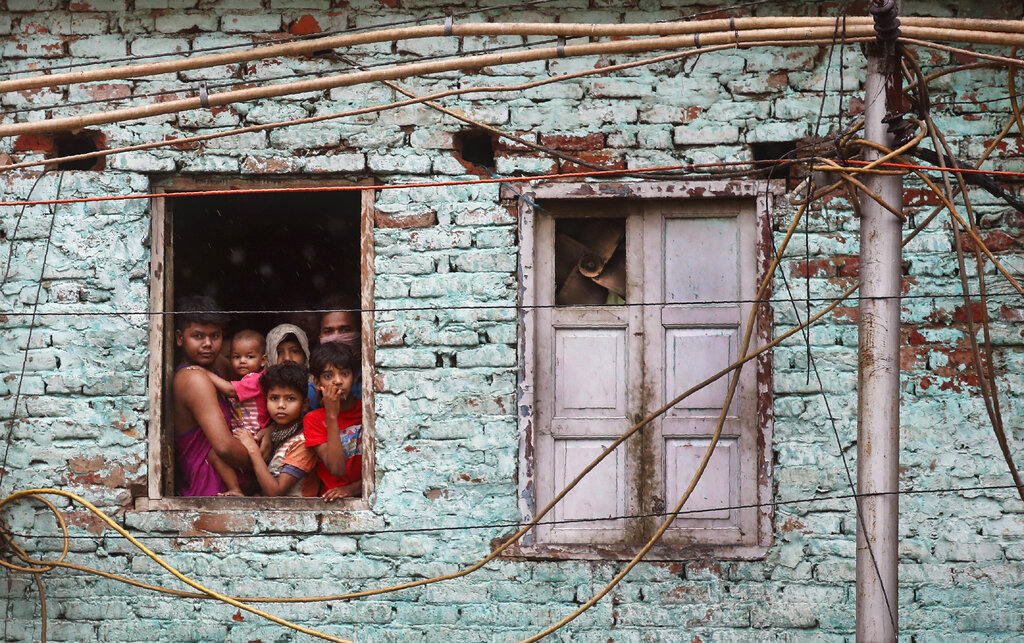
A family from an impoverished settlement looks out from the window of their room during a lockdown to control the spread of coronavirus, in New Delhi, Sunday, May 10, 2020. AP

